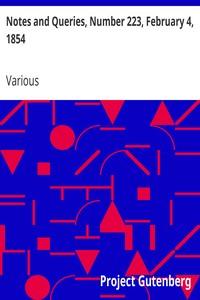Read this ebook for free! No credit card needed, absolutely nothing to pay.
Words: 129573 in 33 pages
This is an ebook sharing website. You can read the uploaded ebooks for free here. No credit cards needed, nothing to pay. If you want to own a digital copy of the ebook, or want to read offline with your favorite ebook-reader, then you can choose to buy and download the ebook.


: The Sexual Life of the Child by Moll Albert Thorndike Edward L Edward Lee Contributor Paul Eden Translator - Sex instruction; Children Sexual behavior Sociology
the homosexual man--declares at first, when inquiries are made, that she has never experienced any inclination for members of the other sex; whereas, at any rate in a large proportion of cases, a stricter examination of her memory, or the reports of other individuals, will reveal beyond dispute that in childhood heterosexual inclinations were not lacking.
Nor is observation in any way adapted to furnish us with a clear picture of the sexual life of the child. So little can be directly observed, that in the absence of reports much would remain entirely unknown. From the moment when the children gain a consciousness, however obscure, of the nature of sexual processes, they almost invariably endeavour to conceal their knowledge as much as possible, so that we shall discover its existence only by a rare chance. None the less, the results of direct observation are often important; sometimes because we are able to watch children when they are unaware of our attention, and sometimes because they do not as yet fully understand the nature of the processes under observation, and for this reason are less secretive.
The third method, that of experiment, is available to us only in the form of castration. I need not dilate on the inadequacy of this application of the experimental method, even apart from the fact that it subserves our purposes almost exclusively in respect of the male sex--for in the case of young girls, castration is almost entirely unknown.
Thus we see that all our methods of investigation exhibit extensive lacunae, and further, that they are all in many respects fallacious; we shall therefore endeavour to supplement each by the others, in order to arrive at results which shall be as free from error as possible. Thus guided, we learn that sexual incidents occur in childhood far more frequently than is usually supposed. So common are they, that they cannot possibly escape the notice of any practising physician or educationalist who pays attention to the question, provided, of course, that he enjoys the confidence of the parents. These latter have often been aware of such sexual manifestations in their children for a long time, but a false shame has prevented them from asking the advice of the physician. They have been afraid lest he should regard the child as intellectually or morally deficient, or as the offspring of a degenerate family. In addition, we have to take into account self-deception on the part of the parents, who, indeed, often deceive themselves willingly, saying to themselves that the matter is of no importance, and that the symptoms will disappear spontaneously.
Having given this brief account of the terminology to be employed and of the methods of investigation, I propose to sketch no less briefly the history of the subject.
Remarkably little material do we find, however, in many works in which we might have expected to find a great deal. I refer to works on education and on the psychology of the child. In exceptional instances, indeed, as I have already indicated, the educationalists have taken part in the movement in favour of sexual enlightenment. But when we consider the enormous importance and great frequency of the sexual processes of the child, we are positively astounded at the manner in which this department of knowledge has been ignored by those who have written on the science and art of education, and by those psychologists who have occupied themselves in the study of the mind of the child. Has it been a false notion of morality by which these investigators have been withheld from the elucidation of the sexual life of the child? Or has the reason merely been their defective powers of observation? As a matter of fact, I suppose that both these causes have operated in producing this remarkable gap in our knowledge.
A certain amount of material is to be found in a number of books on zoology, and also in a few quite recent works on comparative psychology. Among works of the former class I mention especially that of Brehm, who has reported a considerable number of individual details; of books on comparative psychology, one of the most useful for our purposes is that of Groos, who gives us much valuable information regarding love-games of young animals.
Most charmingly Hebbel describes his first experience of love, when but four years old. "It was in Susanna's dull schoolroom, also, that I learned the meaning of love; it was, indeed, in the very hour when I first entered it, at the age of four. First love! Who is there who will not smile as he reads these words? Who will fail to recall memories of some Anne or Margaret, who once seemed to him to wear a crown of stars, and to be clad in the blue of heaven and the gold of dawn; and now--but it would be malicious to depict the contrast! Who will fail to admit that it seemed to him then as if he passed on the wing through the garden of the earth, flitting from flower to flower, sipping from their honey-cups; passing too swiftly, indeed, to become intoxicated, but pausing long enough at each to inhale its divine perfume!... It was some time before I ventured to raise my eyes, for I felt that I was under inspection, and this embarrassed me. But at length I looked up, and my first glance fell upon a pale and slender girl who sat opposite me: her name was Emily, and she was the daughter of the parish-clerk. A passionate trembling seized me, the blood rushed to my heart; but a sentiment of shame was also intermingled with my first sensations, and I lowered my eyes to the ground once more, as rapidly as if I had caught sight of something horrible. From that moment Emily was ever in my thoughts; and the school, so greatly dreaded in anticipation, became a joy to me, because it was there only that I could see her. The Sundays and holidays which separated me from her were as greatly detested by me as in other circumstances they would have been greatly desired; one day when she stayed away from school, I felt utterly miserable. In imagination she was always before my eyes, wherever I went; when alone, I was never weary of repeating her name; above all, her black eyebrows and intensely red lips were ever before my eyes, whereas I do not remember that at this time her voice had made any impression on me, although later this became all-important."
A valuable source of data for our field of inquiry exists in the form of unpublished diaries, autobiographies, and albums, which are not accessible to the general public. I have myself had the opportunity of studying a number of records of this nature, and have formed the opinion that a quantity of invaluable material lies hidden in these recesses. I may add that the records I have been able to use have not only related to living persons; in addition, I have been able to study a number of albums and diaries dating from an earlier day. These have remained unpublished, in part because they appeared to be of interest only to the families of the writers, and in part because many of them were in intention purely private memoranda, a written record for the sole use of the writer.
Speaking generally, however, this province of research has received but little scientific attention; and of comprehensive studies, intended to throw light on every aspect of the sexual life of the child, not a single one is known to me.
THE SEXUAL ORGANS--THE SEXUAL IMPULSE
A proper understanding of physiological functions is based upon anatomical knowledge of the organs concerned. For our purpose, therefore, a knowledge of the sexual organs of the child is essential. The proper course, in this instance, appears to be to start with an account of the adult organs, and then to describe the distinctive characteristics of the same organs in the child. Let us, then, begin with the organs of the adult man.
Free books android app tbrJar TBR JAR Read Free books online gutenberg
More posts by @FreeBooks


: China Japan and the U.S.A. Present-Day Conditions in the Far East and Their Bearing on the Washington Conference by Dewey John - Eastern question (Far East); China Foreign relations Japan; Japan Foreign relations China; United States Foreign relations Chi






